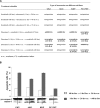Low-dose taxotere enhances the ability of sorafenib to induce apoptosis in gastric cancer models
- PMID: 20015197
- PMCID: PMC3822798
- DOI: 10.1111/j.1582-4934.2009.00993.x
Low-dose taxotere enhances the ability of sorafenib to induce apoptosis in gastric cancer models
Abstract
Despite the low efficacy of conventional antitumour drugs, chemotherapy remains an essential tool in controlling advanced gastric and oesophageal cancers. We aimed to provide a biological rationale based on the sorafenib-taxotere interaction for the clinical treatment of gastric cancer. In vitro experiments were performed on four human gastric cancer cell lines (GK2, AKG, KKP and NCI-N87). Cytotoxicity was evaluated by sulforhodamine B (SRB) assay, cell cycle perturbations, apoptosis and mitotic catastrophe were assessed by flow cytometric and microscopic analyses, and protein expression was studied by Western blot. In the in vivo experiments, nude mice xenografted with the most resistant line were treated with sorafenib and docetaxel singly or in association. Sorafenib inhibited cell growth (IG(50) values ranged from 3.4 to 8.1 μM) and caused down-regulation of MAP-K/ERK phosphorylation and of mcl-1 and p-bad expression after a 48-hr exposure. Apoptosis induction was associated with caspase-3 and -9 activation and mitochondrial membrane depolarization. The drug combination enhanced apoptosis (up to 80%) and produced a synergistic interaction when low doses of the taxane preceded administration of the antityrosine kinase. This synergism was probably due to the induction of an anomalous multidiploid G0-G1 peak and to consequent mitotic catastrophe, which increased sensitivity to sorafenib. Consistent with in vitro results, the docetaxel-sorafenib sequence exhibited high therapeutic efficacy in NCI-N87 mouse xenografts producing tumour weight inhibition (> 65%), tumour growth delay (up to 25 days) and increased mouse survival (30%). Our findings suggest the potential clinical usefulness of treatment with sorafenib and docetaxel for advanced gastric cancer.
© 2011 The Authors Journal of Cellular and Molecular Medicine © 2011 Foundation for Cellular and Molecular Medicine/Blackwell Publishing Ltd.
Figures





Similar articles
-
Sorafenib inhibits 5-fluorouracil-resistant gastric cancer cell growth.Scand J Gastroenterol. 2017 May;52(5):577-584. doi: 10.1080/00365521.2017.1278786. Epub 2017 Jan 22. Scand J Gastroenterol. 2017. PMID: 28110575
-
Sorafenib, a multikinase inhibitor, enhances the response of melanoma to regional chemotherapy.Mol Cancer Ther. 2010 Jul;9(7):2090-101. doi: 10.1158/1535-7163.MCT-10-0073. Epub 2010 Jun 22. Mol Cancer Ther. 2010. PMID: 20571072
-
Inhibition of Bcl-2 antiapoptotic members by obatoclax potently enhances sorafenib-induced apoptosis in human myeloid leukemia cells through a Bim-dependent process.Blood. 2012 Jun 21;119(25):6089-98. doi: 10.1182/blood-2011-09-378141. Epub 2012 Mar 23. Blood. 2012. PMID: 22446485 Free PMC article.
-
In vitro and in vivo antitumor efficacy of docetaxel and sorafenib combination in human pancreatic cancer cells.Curr Cancer Drug Targets. 2010 Sep;10(6):600-10. doi: 10.2174/156800910791859489. Curr Cancer Drug Targets. 2010. PMID: 20491617 Review.
-
Sorafenib sensitizes (-)-gossypol-induced growth suppression in androgen-independent prostate cancer cells via Mcl-1 inhibition and Bak activation.Mol Cancer Ther. 2012 Feb;11(2):416-26. doi: 10.1158/1535-7163.MCT-11-0559. Epub 2011 Dec 21. Mol Cancer Ther. 2012. PMID: 22188816
Cited by
-
Targeted therapies for gastric cancer: current status.Drugs. 2011 Jul 30;71(11):1367-84. doi: 10.2165/11592530-000000000-00000. Drugs. 2011. PMID: 21812503 Review.
-
PLGA Nanoparticles Loaded with Sorafenib Combined with Thermosensitive Hydrogel System and Microwave Hyperthermia for Multiple Sensitized Radiotherapy.Pharmaceutics. 2023 Feb 1;15(2):487. doi: 10.3390/pharmaceutics15020487. Pharmaceutics. 2023. PMID: 36839808 Free PMC article.
-
Pterostilbene enhances sorafenib's anticancer effects on gastric adenocarcinoma.J Cell Mol Med. 2020 Nov;24(21):12525-12536. doi: 10.1111/jcmm.15795. Epub 2020 Oct 13. J Cell Mol Med. 2020. PMID: 33047871 Free PMC article.
References
-
- Kelley JR, Duggan JM. Gastric cancer epidemiology and risk factors. J Clin Epidemiol. 2003;56:1–9. - PubMed
-
- Pozzo C, Barone C. Is there an optimal chemotherapy regimen for the treatment of advanced gastric cancer that will provide a platform for the introduction of new biological agents? Oncologist. 2008;13:794–806. - PubMed
-
- Cunningham D, Allum WH, Stenning SP, et al. Perioperative chemotherapy versus surgery alone for resectable gastroe-sophageal cancer. N Engl J Med. 2006;355:11–20. - PubMed
-
- Boige V, Pignon J, Saint-Aubert B, et al. Final results of a randomized trial comparing preoperative 5-fluorouracil (F)/cisplatin (P) to surgery alone in adenocarcinoma of stomach and lower esophagus (ASLE): FNLCC ACCORDO07-FFCD 9703 trial. Proc Am Soc Clin Oncol. 2007;25:4510a.
-
- Medical Research Council Oesophageal Cancer Working Group. Surgical resection with or without preoperative chemotherapy in oesophageal cancer: a randomized controlled trial. Lancet. 2002;359:1727–33. - PubMed
MeSH terms
Substances
LinkOut - more resources
Full Text Sources
Other Literature Sources
Medical
Research Materials
Miscellaneous

